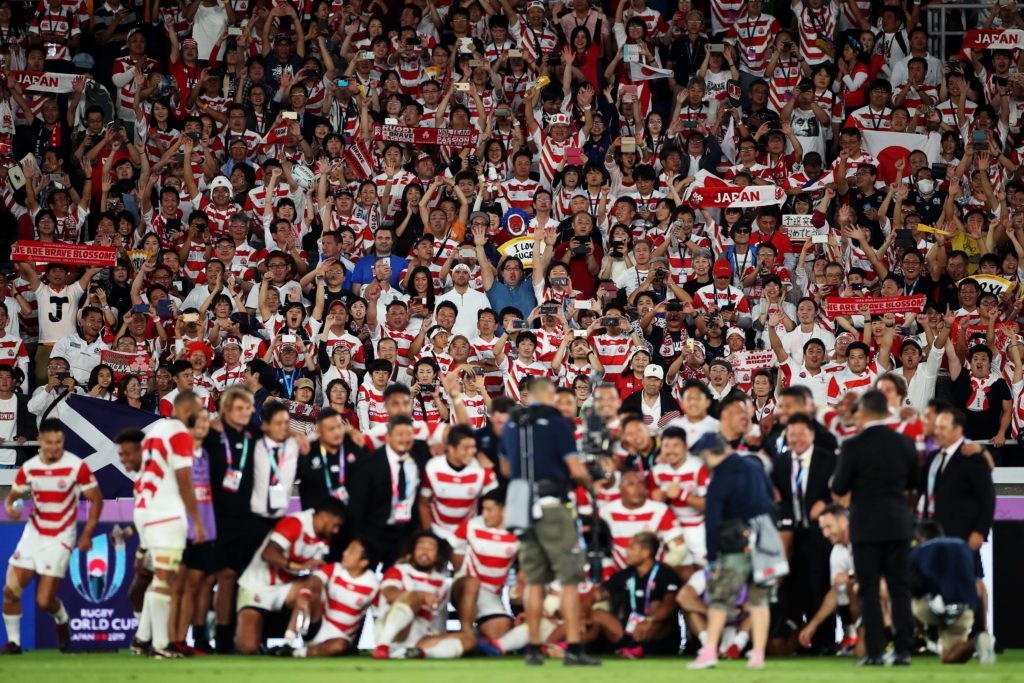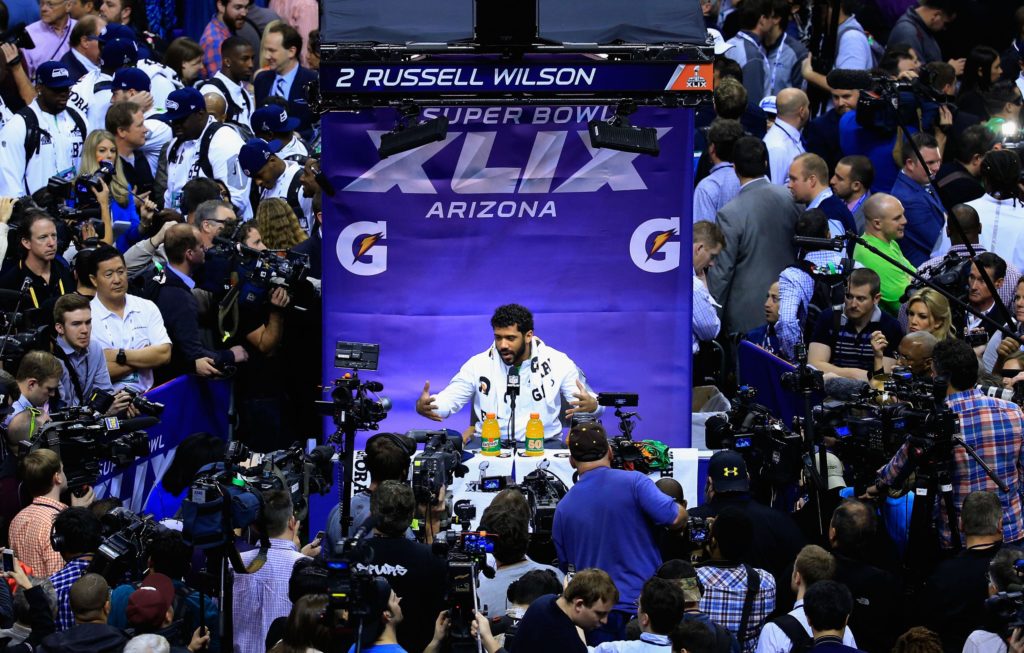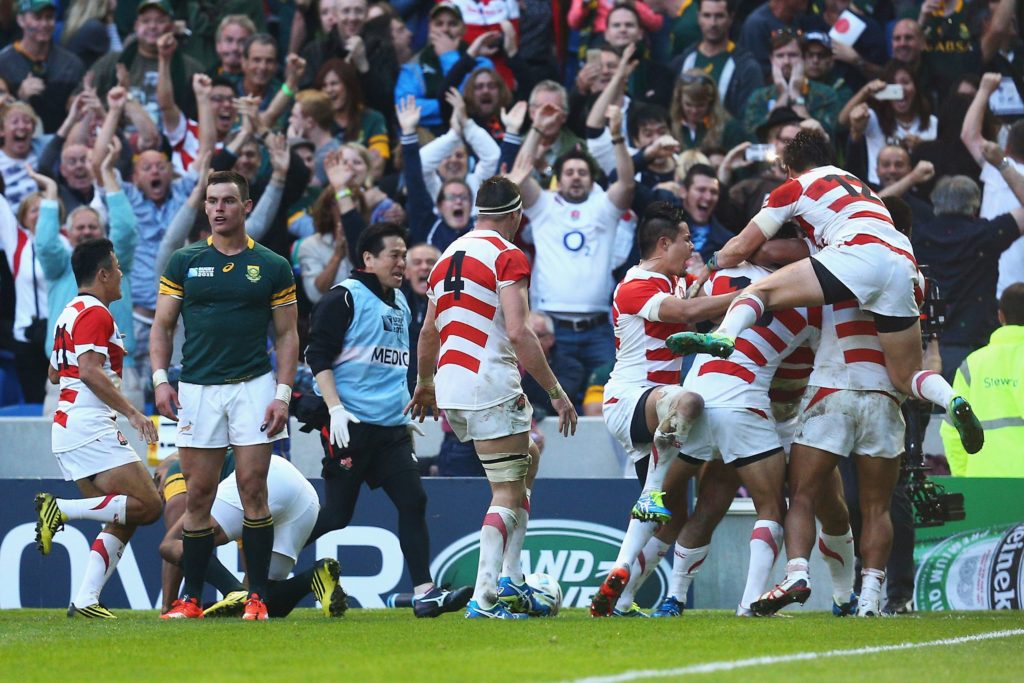American football is a fan favourite in the USA. Why not rugby? What if the big stadiums reserved for Conference finals and the Super Bowl itself played host to rugby’s elite over the course of a World Cup? What would a global tournament do for the game in the USA, and for the sport as a whole?
USA coach Gary Gold considered the possibilities when he travelled to Miami for the Super Bowl last year. This was in the time before lockdowns and social distancing – and more than 100,000 fans had gathered across South Beach to engage in various forms of pre-match revelry.
Later, after the masses had filed into the stadium to watch the Kansas City Chiefs play the San Francisco 49ers, Gold was struck by the match-day experience. The well-travelled coach wondered if rugby could do more to harness the numbers and passion of America’s sporting community.
Next year, World Rugby will reveal where the 2027 and 2031 World Cups will be staged. At this point, Australia and the USA – in a joint bid with Canada – are in the race for the 2027 showpiece, although Russia has expressed their desire to host a World Cup in the near future.
Some might suggest that Australia is a ‘safer’ option, given the strength of the rugby structures Down Under. And yet, after the most recent World Cup in Japan shattered all records as well as many perceptions about second-tier rugby nations, World Rugby may be inclined to hand the USA a golden opportunity.
There are further benefits in taking the tournament to a country like the USA, who certainly know how to put on a show.
USA coach Gary Gold on America hosting a World Cup
“That was the big thing with taking the World Cup to a so-called minnow country, nobody was sure it would work,” Gold tells The XV. “Nobody was sure if the World Cup in Japan would be commercially viable, or if the time zones would work for audiences on the other side of the world.
“But look at what happened. The local people bought into it. It was widely hailed as one of the most competitive tournaments in history. It was a massive success on and off the field.
“World Rugby would have learnt a great deal from that experience. There are further benefits in taking the tournament to a country like the USA, who certainly know how to put on a show.”

Next year, World Rugby will make its decision according to a list of criteria. The much-maligned voting process that resulted in France swiping the 2023 hosting rights from under South Africa’s nose has been axed. The upshot is that the USA should have a fair crack at hosting the 2027 event.
“Ideally, we would want to host it sooner rather than later,’ says Gold, who has been at the helm of the USA national side since 2018.
“We need that tournament to boost the sport in the USA and to emulate Japan. Missing out on the chance to host it could be catastrophic for the local game.
“We’ve already seen the Union chopped down to its knees,” he adds, referring to USA Rugby’s decision to file for bankruptcy in 2020. “That can’t happen again. The USA government doesn’t allow that. If that happens a second time, you’re in real trouble.”
Why hasn’t there yet been a significant investment in USA Rugby, even though the national team has been a regular feature at World Cup tournaments over the years?
“Investors want to know that the sport is working towards something like a World Cup in the country,” said Gold. “The Major League Rugby tournament, which was introduced in 2018, is still young and investors are reluctant to pour money into growing the local game.
“It’s a chicken-and-egg scenario. We need to build the game in the USA from the bottom up, but we also need more exposure and investment to do that. A lot would change if we received the green light to host a World Cup.”
World Rugby has often expressed a desire to tap into the American market. Plans to form a Super Rugby franchise in the USA and to bring the Eagles into an expanded Rugby Championship have been formulated – but are yet to be implemented.
They take everything to the next level in the States… When I went to the Super Bowl , I downloaded an app that allowed me as a fan to watch the game from five different angles.
Former Springboks assistant coach Gold on the fan experience in the NFL
“Everyone realises the potential benefits of landing a big TV deal in the States,” said Gold. “It’s massive. The trick is to give the networks a reason for a vested interest in the game.
“You need a World Cup to make a sport like rugby viable for CBS or ESPN. Alternatively, you need to be participating in a top tournament like Super Rugby and to host top teams from New Zealand on a regular basis.
“The networks are after eyeballs. If you start marketing the World Cup in America, and you get to the point where you can be sure that about 20 per cent of the population will watch it, you will have a lot of companies fighting for advertising slots on that platform.
“They take everything to the next level in the States, even the fan engagement. When I went to the Super Bowl , I downloaded an app that allowed me as a fan to watch the game from five different angles. After a touchdown, I had the chance to review it from five different viewpoints – on my phone. That service, of course, is sponsored and an ad will pop up each time you use it.
“I wouldn’t be surprised if the big TV networks introduced similar innovations after getting involved in the hosting of a Rugby World Cup.”
Rugby has been played in the USA for more than 100 years. It’s popular at more than 100 universities across the country, and the 12-team MLR competition has grown since its inaugural season in 2018.
And yet, the 15-man game has some way to go before it can match sevens – and more traditional American sports – for popularity. Sevens, for example, has received more backing than 15s because it is played at the Olympic Games.
“The USA sevens side wasn’t very competitive before sevens joined the Olympics,” said Gold. “When it became an Olympic sport, the US Olympic committee became involved in running the programme.
“I’m convinced that there would be a similar shift in the attitude towards the 15-man game if the USA won the rights to host a World Cup, Enough people over here would recognise the significance of hosting the third-biggest sporting event on the planet. They would realise that the host nation has to be competitive.
“Perhaps a few American people will expect us to go on and win the whole thing. That’s probably unrealistic. That said, we will have to emulate what Japan did in 2019. We will have to make the quarter-finals.”

Gold is one of rugby’s most experienced, coaches, having travelled far and wide. After serving as an assistant coach at the Springboks, he enjoyed various stints in the Premiership, Top League and Super Rugby tournaments.
Gold was at the helm of the Kobelco Steelers in 2014. After Japan won the hosting rights for the 2019 World Cup, he witnessed a profound change in the country’s approach towards the sport.
“When World Rugby awards a nation the hosting rights, they want to be certain that the host nation has the very best chance of being competitive,” he said. “Other than the fact that there will be a healthy commercial model in place, World Rugby will help to sustain us as the host nation – as was the case when they gave the World Cup to Japan.
“Eddie Jones, who was Japan head coach at the time, made a massive difference. The Japanese players were largely amateur at that stage. Eddie injected some much-needed professionalism into the set-up. What mattered most was that Eddie received the necessary time and resources to mould Japan into a competitive team.”
The Brave Blossoms sent shockwaves through the rugby world when they beat the more-fancied Springboks at the 2015 World Cup. While they failed to qualify for the next round of the tournament, it was plain to see how much progress had been made.
Jamie Joseph built on that success when he succeeded Jones in 2016. Japan were more competitive in the lead-up to the 2019 World Cup. They went on to qualify for the World Cup playoffs – for the first time in their history – after claiming major wins against Ireland and Scotland.

Can the USA follow suit if they win the rights to host a global tournament? Will they receive more backing as a result? Gold is optimistic. The Eagles have taken significant strides since Gold assumed control in 2018. After winning the American Rugby Championship, the USA beat Scotland to record their first victory against a tier-one nation.
“There’s no doubt that the national team have a role to play in raising the profile of the game,” said Gold. “We saw what a difference it made after we beat Scotland in 2018. The level of interest spiked.
“Sure, that was a friendly staged on a sweltering day in Houston. It wasn’t quite on the same level as a World Cup game between Japan and South Africa in Brighton, but it was an important first step.
“The next challenge is to go to a World Cup and fire a few shots. You want to emulate what Japan did in 2015. People are still talking about that win against South Africa some six years later.
“We were more competitive at the 2019 World Cup, but we failed to convert those competitive performances into wins.”
Gold realises how hard Japan fought to become a competitive – and ultimately respected – team in the lead-up to the 2019 World Cup. The road to a World Cup staged in the USA would be similarly challenging for an American national side.
We can carry on playing against tier-two teams and enjoying some success, but we’re not going to improve until we play the tier-one nations regularly.
“We had seven USA players competing across the Premiership and Top 14 recently. It may not sound like much, but it’s a start,” he said. “That experience of facing top opposition on a weekly basis is invaluable. Hopefully the MLR tournament will go ahead as planned this year and everyone will have the chance to play regularly.
“The next step for us as a tier-one team is to spend more time together and to have more training camps. We need to understand that there’s another level of performance and conditioning required to excel against top opposition.
“We can carry on playing against tier-two teams and enjoying some success, but the fact of the matter is that we’re not going to improve until we have the chance to play the tier-one nations regularly.”
USA played against Ireland in Dublin back in 2018. At that stage, Ireland were the best team in the world. “We were competitive for 56 minutes of that game –there was one score in it – and then suddenly it all changed in a short period of time,” said Gold. “The floodgates opened and we lost 57-14. If you’re playing those types of games regularly, however, you will learn how to cope.
“It’s a chicken-and-egg scenario, though. Is a private investor going to pump a lot of money into the national team at this stage and help us to grow? Probably not. There’s nobody with a magic wand who can solve this problem overnight.
“We need a game-changer. We need a World Cup.”
More stories by Jon Cardinelli
If you’ve enjoyed this article, please share it with friends or on social media. We rely solely on new subscribers to fund high-quality journalism and appreciate you sharing this so we can continue to grow, produce more quality content and support our writers.


Comments
Join free and tell us what you really think!
Sign up for free